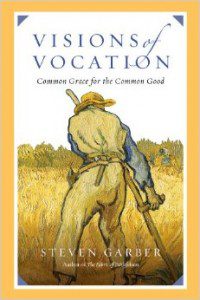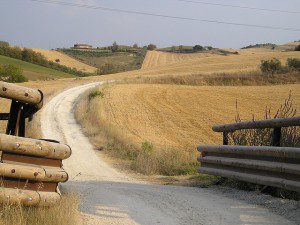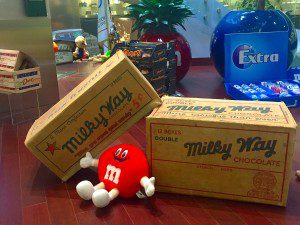 This excerpt from Steve Garber’s book Visions of Vocation is reprinted here with the kind permission of InterVarsity Press. Stay tuned as we continue to occasionally publish excerpts from the book here at Visions of Vocation the blog. And get the book from IVP at this link!
This excerpt from Steve Garber’s book Visions of Vocation is reprinted here with the kind permission of InterVarsity Press. Stay tuned as we continue to occasionally publish excerpts from the book here at Visions of Vocation the blog. And get the book from IVP at this link!
[Steve writes about some of his friends:] In the relationships and responsibilities of common life, they see themselves as implicated in the way the world is and ought to be. They see themselves as having vocations that call them into life, into the world—into a way of knowing that implicates them, for love’s sake. And in the unfolding of my life, living where I have lived, working where I have worked, I have met some of those people.
We all have many conversations, and most of them slowly fall into the mist of the past. But some of them we remember, and I remember one from a weekend retreat some years ago , hearing a question at the Saturday evening campfire, “Can we talk ?” The question became a conversation, and the conversation became a friendship.
Kwang Kim is the most global citizen that I know. Born of Korean parents from the North and the South, he grew up in Latin America: first in Argentina, then Brazil and finally Ecuador. He moved to Los Angeles for undergraduate study, then on to Boston for graduate school, and with years of learning to steward, he then began a career at the World Bank. If there is a question at the heart of his life, it is this: What should the world be like? Is there a way we ought to live in the world, one that has implications for the way that development is done, whether that is in the Middle East, Latin America, Africa or in the cities and societies of the Northern Hemisphere where there is still such crying need? Having spent the last twenty years thinking about the way we help—the way large multinational organizations like the World Bank assist the needy nations of the earth— Kwang is captivated by the question, What ought we to be doing? Are there norms for development? Do we have any access to what it is supposed to be? Can we ever know what development should be? Are there any oughts and shoulds in this whatever world? Or are we only left with culturally relative “maybes” and “perhapses”?
 Able to think and speak and write in many languages, Kwang lives his heart out all over the world. His years at the World Bank have taken him for periods of time to Pakistan, to Jordan, to the Caribbean and to several countries of Latin America. Always the passion guiding his work is to rethink the way development is done, longing to be part of something more sustainable, where the hours and dollars mean honest change for the good of those who live with the programs and plans of the Bank. Watching as I do, I am intrigued when someone sees seamlessly, when someone’s instincts are to find the connections between ideas, when someone assumes that there is a coherence to the cosmos— and that our task is to understand it.
Able to think and speak and write in many languages, Kwang lives his heart out all over the world. His years at the World Bank have taken him for periods of time to Pakistan, to Jordan, to the Caribbean and to several countries of Latin America. Always the passion guiding his work is to rethink the way development is done, longing to be part of something more sustainable, where the hours and dollars mean honest change for the good of those who live with the programs and plans of the Bank. Watching as I do, I am intrigued when someone sees seamlessly, when someone’s instincts are to find the connections between ideas, when someone assumes that there is a coherence to the cosmos— and that our task is to understand it.
From my earliest conversations with Kwang, that was true. In the questions he asked and the visions he pursued there was a thread that ran through everything he took up. In a word, it was integrity. Not only for his life as a human being, an Asian/ Latino/ American, but as someone with a calling into the socio-political economies of the world, with their almost unfathomable complexity. Even in the midst of that work, Kwang wrestles his way to coherence. That is not romanticism . He does not give an inch to pie-in-the-sky. Rather, he works hard to master the information that each situation presents, bringing his own vocation to the dynamics of the assignment.
Over time he has begun to see that there are in fact “true truths” about development, ones that are as meaningful to Latinos as they are to Pakistanis as they are to Arabs. But he also recognizes that development is broken, and Kwang has chosen a path to promote change from within. With his own necessary sophistication, having to speak the language of the Bank because that is the context of his work, he argues that humility and mutuality are the heart of good development programs. The Bank can be the proverbial elephant in the room, requiring that everyone pay most attention to what it says and does. Among the nations of the earth, that does not make for a good future. Instead it breeds resentment on a large scale, and what might happen for good is more often than not frustrated by the tensions produced by arrogance in all its insidiousness.
People want to know that they are being honestly served by people who are honest servants. And people as people want to know that everyone’s ideas matter, so for an economic development project to work in Guatemala it has to be primarily the Guatemalan people that give shape and substance to the project. The Bank is an important partner, but it must be a partner— and it can do this by becoming an effective broker to the voices of the poor as it takes its place in the collage of local industrialists, the requirements of internal and external bureaucracies, and, of course, always amid the reality of global trends. And it is this that Kwang gives himself to wherever his work calls him, month by month, year after year.
Those virtues of humility and mutuality find their place in the serious , sustained debates about social structures that over time will either make or break the program, and that is always incredibly complex. But the structures do not exist or have life on their own. Rather, it is the virtues— a word formed by the Latin vir, or what human beings are supposed to be, are meant to be— that give life to the structures, bringing flourishing to aching people in aching places. There is more to Kwang’s life than the Bank though. For years now he has given time and energy to the renewal of North Korean culture, meeting monthly to pray with other Korean Americans in Washington, each one autobiographically implicated in the hopes of their homeland.
The Washington group is only one of many like this all over the United States and Canada, each one full of eager, bright, motivated men and women who yearn together for a new day in Korea, where social and political and economic and artistic flourishing will become reality— because that is the way it is supposed to be, for everyone everywhere. In the end, all of us are best known by the questions that keep us up at night and that wake us in the morning. What should the world be like? is the animating question at the heart of Kwang’s life, making sense of his days and his nights. That is what a vocation is, and does.
Image: Roberto La Forgia, “The Way.”
Taken from Visions of Vocation by Steven Garber. Copyright (c) 2014 by Steven Garber. Used by permission of InterVarsity Press, P.O. Box 1400, Downers Grove, IL 60515-1426. www.ivpress.com











